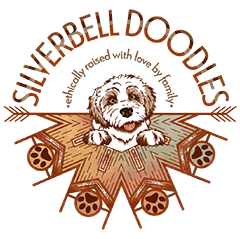Healthy Puppy Signs: How to Know Your Puppy is Thriving
Healthy Puppy Signs
Bringing home a new puppy is one of life’s most joyful experiences. Whether you’re a first-time dog owner or adding a new member to your furry family, it’s important to ensure your puppy is healthy and developing properly. Recognizing healthy puppy signs will help you monitor their growth, catch potential health issues early, and ensure that your puppy thrives in their new environment.
At SilverBell Doodles, we raise our puppies with love, care, and attention to ensure they’re in peak health before joining their new families. Our years of experience as ethical breeders have given us insight into what makes a puppy healthy and happy. In this guide, we’ll walk you through the key signs of a healthy puppy, so you can feel confident your furry friend is off to a great start.
What Are the Signs of a Healthy Puppy?
Healthy puppies are active, alert, and full of energy. But beyond their cute, playful nature, there are specific indicators that can give you peace of mind about your puppy’s health. Here’s what to look for:
1. Bright, Clear Eyes
A puppy’s eyes are a window into their overall health. Bright, clear eyes without discharge or cloudiness are one of the most important healthy puppy signs. A healthy puppy should have eyes that are free of redness, irritation, or excessive tearing.
What to Watch For:
- No discharge: While some tear staining is normal for certain breeds, excessive discharge or mucus around the eyes can indicate an infection or allergy.
- No cloudiness: Cloudy or dull-looking eyes could be a sign of an underlying health issue, such as cataracts or infection.
2. Clean Ears with No Odor
Healthy puppies should have clean, odor-free ears. Puppies are prone to ear infections, especially those with floppy ears, so it’s important to check their ears regularly.
What to Watch For:
- No bad odor: A foul smell coming from your puppy’s ears may indicate an infection.
- No redness or inflammation: Redness, swelling, or your puppy excessively scratching their ears could be signs of an ear infection or mites.
- Minimal wax: A small amount of wax is normal, but a large buildup or black, crumbly discharge could point to ear mites or infection.
3. Shiny, Soft Coat
A healthy puppy’s coat should be shiny, soft, and free of bald patches. Their skin should be clean and free of bumps, rashes, or scabs. If your puppy’s coat is dull or flaky, it could be a sign of malnutrition or skin issues.
What to Watch For:
- No excessive shedding: While some shedding is normal, especially during seasonal changes, excessive shedding could be a sign of stress, poor diet, or underlying health issues.
- No itching or dandruff: Itchy skin or dandruff might indicate allergies, skin infections, or parasites like fleas.
4. Steady, Healthy Appetite
A healthy puppy will have a consistent appetite. Puppies are naturally energetic and need a lot of nutrition to support their rapid growth, so regular eating is key. If your puppy is eating well, it’s usually a good sign that they’re healthy.
What to Watch For:
- No vomiting or diarrhea: Occasional stomach upset can happen, but frequent vomiting or diarrhea may be a sign of digestive issues, infections, or food intolerance.
- Normal eating habits: If your puppy suddenly refuses to eat or seems lethargic during mealtimes, it could indicate a problem that needs attention from a vet.
5. Energetic and Playful Behavior
Healthy puppies are typically active, playful, and curious. They love to explore, play with toys, and engage with their humans. While all puppies need sleep (and lots of it), they should be lively during their waking hours.
What to Watch For:
- Normal energy levels: Lethargy or disinterest in play, especially if combined with other symptoms like vomiting or lack of appetite, could be a sign of illness.
- Normal coordination: Puppies are naturally clumsy, but if your puppy seems excessively wobbly or has trouble walking, it could be a sign of a health issue.
6. Healthy Gums and Teeth
Puppies, like adult dogs, should have pink gums and clean teeth. Their breath shouldn’t have a strong, unpleasant odor, and their gums should not be red or swollen.
What to Watch For:
- Pink gums: Pale or white gums can indicate anemia or dehydration, while red or inflamed gums might suggest infection or dental issues.
- No bad breath: Bad breath in puppies is not normal and could be a sign of dental disease, poor diet, or gastrointestinal issues.
7. Normal Weight and Growth
A healthy puppy will have a steady growth rate and maintain a normal weight for their breed and age. Puppies should feel neither too thin nor too heavy when you gently run your hands along their ribs.
What to Watch For:
- Steady weight gain: Rapid weight loss or excessive weight gain should be addressed by a vet. A healthy puppy should be gaining weight at a consistent pace, especially during their early months of life.
- No visible ribs or hip bones: You should be able to feel your puppy’s ribs without pressing hard, but they shouldn’t be visible or protruding.
8. Good Digestion and Regular Bowel Movements
One of the simplest indicators of a healthy puppy is normal digestion and regular bowel movements. Puppies should have stools that are firm, well-formed, and regular in frequency. Loose stools or diarrhea are red flags that something could be wrong.
What to Watch For:
- No constipation or diarrhea: Sudden changes in bowel movements, like constipation or diarrhea, could indicate dietary issues, parasites, or gastrointestinal problems.
- No visible worms: If you see worms in your puppy’s stool, a vet visit is necessary for deworming treatments.
9. Breathing Normally
Healthy puppies will have steady, normal breathing both when they’re active and at rest. Breathing should be quiet and smooth, without any wheezing or coughing.
What to Watch For:
- No labored breathing: If your puppy is having difficulty breathing, wheezing, or breathing faster than usual without any obvious cause (like excitement or play), it may indicate respiratory issues or even an infection.
- No coughing or sneezing: While occasional sneezing is normal, frequent sneezing, coughing, or nasal discharge could be signs of respiratory problems.
10. Proper Hydration
A healthy puppy should be well-hydrated. One way to check this is by gently lifting the skin between their shoulder blades—if it snaps back into place quickly, your puppy is properly hydrated.
What to Watch For:
- Dry gums or nose: Dry gums or a dry nose may indicate dehydration, especially if accompanied by lethargy or lack of appetite.
Excessive drinking or lack of thirst: Either extreme—drinking too much or too little—could indicate underlying health problems, such as diabetes or kidney issues.
Ensuring Your Puppy is Healthy and Happy
Keeping an eye on these healthy puppy signs will help you monitor your puppy’s well-being and catch any potential health issues early on. At SilverBell Doodles, we’re dedicated to raising healthy, happy puppies that are ready to thrive in their new homes. If you’re looking to adopt a puppy from a trusted, experienced breeder, we invite you to explore our available puppies and learn more about our breeding practices.
Call us today at 916-886-6192 to learn more about adopting a healthy puppy from SilverBell Doodles. We’re proud to serve families across Idaho and beyond with puppies that are bred with love and care.
Find Your Perfect Healthy Puppy Today! Call 916-886-6192 Now!
How to Keep Your Puppy Healthy
Now that you know the signs of a healthy puppy, here are some tips on how to maintain their well-being:
1. Regular Vet Visits
Your puppy’s health should be regularly monitored by a veterinarian, especially in the first year of life. Regular vet visits allow your puppy to receive important vaccinations, health screenings, and preventive care, such as flea and tick treatments.
2. Balanced Nutrition
A proper diet is essential for your puppy’s growth and development. Be sure to feed your puppy high-quality, balanced puppy food that is appropriate for their breed, size, and age. Consult your vet to determine the best food for your puppy’s specific needs.
3. Exercise and Play
Puppies are full of energy and need regular exercise to stay healthy. Whether it’s a daily walk, playtime in the yard, or games with toys, keeping your puppy active will support their physical and mental development.
4. Socialization
Socializing your puppy from an early age helps them become well-adjusted, confident dogs. Introduce your puppy to new people, environments, and other animals in a controlled, positive way.


